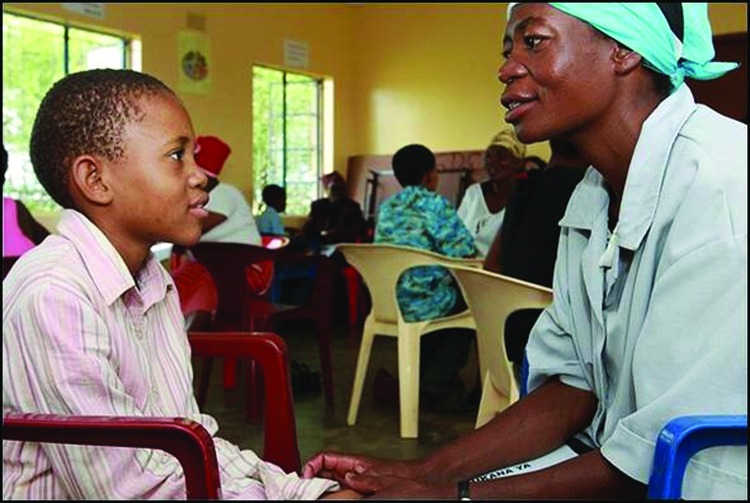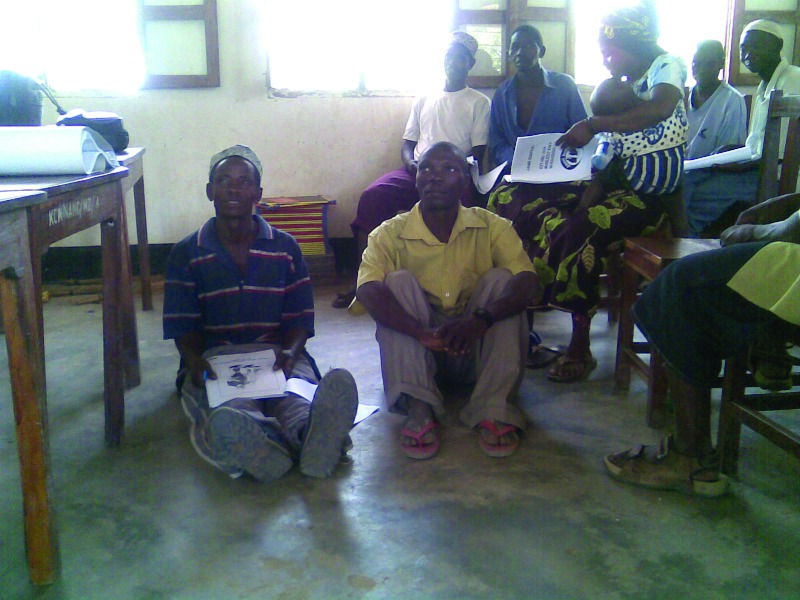Abstract
Parent-based HIV prevention programming may play an important role in reaching youths early to help establish lifelong patterns of safe and healthy sexual behaviors. Families Matter! is a 5-session, evidence-based behavioral intervention designed for primary caregivers of children aged 9 to 12 years to promote positive parenting and effective parent–child communication about sexuality and sexual risk reduction. The program’s 5-step capacity-building model was implemented with local government, community, and faith-based partners in 8 sub-Saharan African countries with good intervention fidelity and high levels of participant retention. Families Matter! may be useful in other resource-constrained settings.
KEY FINDINGS
▪ Parents and other caregivers participating in the Families Matter! Program (FMP) have shown a deep commitment to attending the program and embracing their critical role in helping their children develop healthy sexual behaviors; on average more than 90% of participants attend all 5 of the 3-hour FMP sessions.
▪ Engaging stakeholders and members of the community is critical at every step of the way, from the initial assessment of need and desire for the selected intervention to continuous monitoring of participant satisfaction to ensure that the intervention continues to be relevant and acceptable.
▪ Implementing multisession evidence-based interventions requires specific capacity to ensure that interventions are delivered as intended; provision of guidance and technical assistance is a continuously evolving process that requires being responsive to the realities of the field and able to meaningfully incorporate lessons learned.
REACHING OLDER CHILDREN and adolescents with HIV prevention and sexual health messages during the prerisk window, before sexual behaviors are initiated, is a key component in achieving an HIV-free generation. Prerisk prevention efforts help young people develop and adopt safe and healthy behaviors and sexuality from the start, rather than attempting to change existing risk behaviors. Established risk behaviors can be more difficult to change1 and may have already put youths at risk for HIV and other sexually transmitted infections. Parents are in a unique position to reach youths early, often, and comprehensively with information and support regarding sexuality, risk, and responsible sexual decision-making skills. A review of research in 53 countries found a consistent and significant relationship between positive parent–child relationships and delayed sexual debut.2 Although many parents worry that their children will not be receptive to conversations with them about sexual topics, research has shown that children and adolescents are ready for sexuality information from parents and that parents are their preferred source of information about sexual behavior.3 Kenyan youths surveyed in Nyanza Province identified lack of communication with parents as a barrier to understanding how to prevent HIV infection (H. Vandenhoudt, C. Njue, P. Remes, and A. Buvé, unpublished needs assessment report, 2001), and recent qualitative research conducted for Families Matter! in Botswana found that both male and female adolescents expressed a preference for learning about sexual intercourse and sexual health from their parents (J. S. St Lawrence, E. S. Seloilwe, B. Kgosikwena, et al., unpublished formative work, 2012). However, parents face barriers in communicating about sexual topics, such as lack of knowledge, skills, and confidence,4–6 and many need support in becoming effective sexual health educators for their children.
In Session 5 of Families Matter! sexual risk prevention intervention, parents practice communication skills with their children, Botswana. Photo reprinted with permission of D. H. Friendly/Family Health International.
FAMILIES MATTER!
The Families Matter! Program (FMP) is a 5-session, evidence-based behavioral intervention designed for parents and other primary caregivers (collectively, parents) of children aged 9 to 12 years to promote positive parenting and effective parent–child communication about sexuality and sexual risk reduction.7,8 The ultimate goal of FMP is to delay the onset of sexual debut and reduce sexual risk behaviors among adolescents. FMP offers parents instruction and guidance in general parenting skills related to decreasing sexual risk behavior among youths (e.g., relationship building, parental monitoring) and helps parents develop the communication skills necessary to effectively convey their values and expectations about sexual behavior as well as critical HIV, sexually transmitted infection, and pregnancy prevention messages. The box on page e3 provides an overview of the 5 core FMP sessions and the follow-up booster session offered to parents 6 months to 1 year after the completion of FMP.
| One of the challenges we anticipated in this season was rain! We thought that it was going to affect our programs. We were proved wrong! Attendance has not been affected by the farming activities, and we have maintained our retention rates at above 90% despite the rain season! Indeed it is amazing to see the great passion people showed right at the beginning of the program. One of the major challenges that we encountered was finding a venue for holding sessions. One of the participants offered his two huts as venues for FMP sessions for two groups. People did not want anything to stop them from attending FMP sessions.” |
| —Sira Muleya, Program Manager, FMP Zambia |
FMP was adapted from the US evidence-based intervention Parents Matter!7,8 This program was shown in a randomized controlled trial to promote effective parent–child communication about sexuality and sexual risk reduction.9 The intervention was adapted for use in Kenya in 2003 and 2004 and renamed Families Matter!10 A 2006 evaluation showed that the adapted program was well accepted and retained its effectiveness, successfully increasing parenting skills and parent–child communication about sexuality and sexual risk reduction.8
CAPACITY-BUILDING MODEL
Key to successful delivery of this multisession evidenced-based curriculum is a 5-step capacity-building model, which provides partner organizations with detailed guidance for successful implementation of FMP at every stage (see the box on page e4). This model has been developed and refined over 6 years of experience implementing FMP in sub-Saharan Africa,11 and it reflects lessons learned through working with a range of local partners, including government ministries and nongovernment community and faith-based organizations. The FMP 5-step capacity-building model may be useful to others adapting and implementing evidence-based interventions in resource-constrained settings.
Goals of the model are to
Determine a need and desire for the program at the community level;
Engage communities and stakeholders in informing surface adaptations so that content is culturally relevant and appropriate;
Ensure that the intervention is delivered as intended and with curriculum fidelity by staff who demonstrate thorough knowledge of its content, methods, and goals;
Provide mechanisms for continuously monitoring participant attendance and satisfaction as indicators that the community continues to embrace the program; and
Be consistently flexible and responsive to the realities of the field while remaining true to the goals of the intervention and its evidence-based content and methods.
Overview of Families Matter! Program (FMP) Curriculum Sessions Aimed at Improving Parent–Child Communication and Sexual Risk Prevention Among Parents and Caregivers of Children Aged 9–12 Years
| Session 1 provides parents with an understanding of the purpose and goals of FMP. It includes information on child and adolescent development, and raises parents’ awareness of the unique role they have in influencing their children’s participation in healthy and safe behaviors. |
| Session 2 shows parents that it is still their role to guide children even as they grow older, and supports parents in strengthening their parenting skills that support and reinforce risk reduction. Parents work to build strong positive relationships with their children, to improve parent–child communication, and to supervise their children. |
| Session 3 helps parents understand the realities of adolescent sexual behavior. It explains why parents are uniquely suited to deliver sexual risk prevention messages; provides information on social, physical, and emotional development; and describes how parents can raise sexually healthy children. |
| Session 4 helps parents embrace the knowledge, skills, comfort, and confidence needed to engage their children in meaningful, sensitive, and timely discussions about sexual issues and sexual risk reduction. It provides additional sexual and reproductive health information on family planning, sexually transmitted infections, HIV/AIDS, medical male circumcision, prevention of mother-to-child transmission, HIV testing and counseling, and referrals and linkages to local resources. It also helps parents become more aware of their own sexual values and how to communicate those values to their children and introduces communication tools for parents when having sex-related talks with their children. |
| Session 5 lets parents continue to practice the skills they learned by providing time for them to interact and engage in direct communication and skills building practice with their 9- to 12-year-old child. The session also presents a 4-step parenting plan to help children resist peer pressure. |
| The Booster Session reviews the key points of FMP and provides parents an opportunity to discuss the challenges they faced in putting the skills they learned in FMP to use. |
Participatory learning techniques are used to deliver FMP to small groups of parents of children aged 9 to 12 years in 5 weekly 3-hour sessions by certified local facilitators (1 male, 1 female).
IMPLEMENTATION
FMP has gradually expanded throughout sub-Saharan Africa as countries that experience high burdens of HIV among youths and receive funding from the President’s Emergency Plan for AIDS Relief have requested the program. As of September 2012, the US Centers for Disease Control and Prevention, through the Emergency Plan, supported local partners in 8 countries in sub-Saharan Africa with funding and technical assistance for the adaptation, implementation, and scale-up of FMP. Partners collect continuous process-monitoring data, which show high levels of participation and retention: on average more than 90% of participants complete all 5 FMP sessions (Table 1 shows country-level details). Incentives to encourage participant attendance have not been found to be necessary and are strongly discouraged. To date only 1 partner piloted provision of small financial incentives for attendance, but this was discontinued because it was found to be detrimental to the participant recruitment process and contrary to the spirit of the program.
TABLE 1—
Implementation of Families Matter! Sexual Risk Prevention Intervention in 8 Sub-Saharan African Countries
| Country | Implementation Months | Certified Facilitators, No. | Familes Reached, No. | Participant Retention for All 5 Sessions, % |
 Kenya Kenya |
78 | 433 | ≥ 200 000 | NA |
 Botswana Botswana |
11 | 4 | 321 | 80.6 |
 Ivory Coast Ivory Coast |
27 | 10 | 4586 | 94.0 |
 Tanzania Tanzania |
29 | 20 | 12 280 | 95.6 |
 Zambia Zambia |
28 | 10 | 3866 | 90.8 |
 South Africa South Africa |
29 | 14 | 6864 | 91.3 |
 Mozambique Mozambique |
18 | 8 | 3479 | 94.9 |
 Namibia Namibia |
7 | 2 | 153 | 90.5 |
Note. NA = not available. Data are as of January 2013

In an adaptation workshop, Tanzanian participants demonstrate how they would revise a Families Matter! poster to reflect how they sit while they talk with their children. Adaptation workshops ensure that materials are culturally relevant and acceptable. Photo reprinted with permission of K. Mkumbo, F. Tungaraza, University of Dar es Salaam.
These data show that evidence-based interventions can be delivered in the field with rigor and integrity and that despite the real-world difficulties of attending a multisession intervention, if the content resonates with participants, they will come and will keep coming back. Key to this success is the foundation and support created through the 5-step capacity-building model, which lays a solid foundation for the intervention at the community level and ensures that it is delivered as intended and with curriculum fidelity.
Five-Step Capacity-Building Model for Implementation of Families Matter! Program (FMP) Aimed at Improving Parent–Child Communication and Sexual Risk Prevention Among Parents and Caregivers of Children Aged 9–12 Years
| Step 1: Community Needs Assessment and Formative Work |
| Formative work, including a community needs assessment, is conducted to ensure there is a need and desire for FMP in the target community(ies). Guidance is provided on creating a community advisory board to solicit stakeholders’ assistance with activities such as identifying and recruiting parents, scheduling sessions, and securing venues for session delivery. |
| Step 2: Program Adaptation Workshops and Adaptation of Key Materials |
| A 2-day adaptation workshop in the target community is conducted by the implementing organization to ensure that FMP is adapted in a culturally appropriate way. The workshops create buy-in and ownership as community participants—including older youths—provide feedback, suggest modifications, and take part in the design of a country FMP logo. Modifications to the program materials are made by the FMP team. |
| Step 3: Staff Training |
| Potential FMP facilitators participate in both individual and group interviews. Successful candidates attend a 5-day Training of Facilitators (TOF). The TOF is a hands-on, skills-building course that provides participants with in-depth knowledge about how the program works and prepares them to facilitate FMP sessions. Only trainees who demonstrate thorough knowledge of the FMP curriculum and skills to facilitate FMP sessions are certified as FMP facilitators; only certified facilitators may be hired by the implementing organization. Additional staff trainings include a facilitator practice week, a reproductive health and family planning workshop for facilitators, a program managers training, and a monitoring and evaluation workshop. |
| Step 4: Pilot Testing FMP |
| Pilot tests are conducted to validate the adaptations made and to determine whether FMP is acceptable, feasible, and relevant for the community. Pilot testing of FMP involves 2 phases. In the first phase, each facilitator pair delivers the program in an accelerated format (participants receiving the 5 sessions in 5 consecutive days; children attend the 5th session). In the second phase of pilot-testing, the program is delivered as prescribed, with each pair of facilitators delivering the program to between 4 and 8 groups of 12–18 participants who attend an FMP session once a week for 5 consecutive weeks with children attending the 5th session. |
| Step 5: Full Operation |
| Following completion of the pilot tests, full operation and scale-up of the intervention begins. Facilitator pairs deliver the program to up to 8 groups of 12–18 participants per week for 5 consecutive weeks (the series of 5 sessions over the 5 consecutive week period is called a wave). Routine process monitoring and quality assurance checks, including fidelity checks, are conducted and summarized by implementing organizational staff and sent to Centers for Disease Control and Prevention (CDC) headquarters after every wave. CDC headquarters provides ongoing technical assistance through email, conference calls and yearly technical assistance site visits to assist with trouble-shooting. |
NEXT STEPS
Because many of the parenting and communication skills taught in FMP have been shown to be important factors in preventing childhood sexual abuse and increasing children’s disclosure of sexual abuse,12 this widely accepted program has been identified as a platform for childhood sexual abuse prevention.
A sixth FMP session, “Understanding Child Sexual Abuse,” has been developed to address violence against children, in response to study findings that childhood sexual abuse is markedly high in some FMP countries. This new session will be tested through formative and outcome evaluations beginning in 2013.
Several long-term evaluations of FMP are planned for 2013 to 2014. In addition, at the request of implementing partner organizations in several FMP countries, the program is being adapted to address the parent–child communication needs of parents of adolescents (aged 13–18 years).
Acknowledgments
This research was supported by the President’s Emergency Plan for AIDS Relief through the Centers for Disease Control and Prevention.
Note. The findings and conclusions in this article are those of the authors and do not necessarily represent the official position of the Centers for Disease Control and Prevention.
Human Participant Protection
This article describes a program implementation demonstration, not human participant research.
References
- 1. Botvin GJ, Baker E, Dusenbury L, Tortu S, Botvin EM. Preventing adolescent drug abuse through a multimodal cognitive-behavioral approach: results of a 3-year study. J Consult Clin Psychol. 1990;58(4):437–446. [DOI] [PubMed]
- 2. World Health Organization. Broadening the Horizon: Balancing Protection and Risk for Adolescents. 2002. Available at: http://www.who.int/maternal_child_adolescent/documents/fch_cah_01_20/en/index.html. Accessed August 29, 2012.
- 3. Kaiser Family Foundation. National survey of adolescents and young adults: sexual health knowledge, attitudes and experiences. 2003. Available at: http://www.kff.org/youthhivstds/3218-index.cfm. Accessed March 15, 2011.
- 4. Youth Sexuality: Action Research From Burkina Faso and Senegal. Los Angeles, CA: Pacific Institute for Women’s Health; 2002.
- 5. Kirkman M, Rosenthal DA, Feldman SS. Talking to a tiger: fathers reveal their difficulties in communicating about sexuality with adolescents. In: Talking Sexuality: Parent-Adolescent Communication. San Francisco, CA: Jossey-Bass; 2002:57–74. [DOI] [PubMed]
- 6. Wamoyi J, Fenwick A, Urassa M, Zaba B, Stones W. Parent-child communication about sexual and reproductive health in rural Tanzania: implications for young people’s sexual health interventions. Reprod Health. 2010;7:6. [DOI] [PMC free article] [PubMed]
- 7. Dittus P, Miller KS, Kotchick BA, Forehand R. Why Parents Matter!: the conceptual basis for a community-based HIV prevention program for parents of African American youth. J Child Fam Stud. 2004;13(1):5–20.
- 8. Vandenhoudt HA, Miller KS, Ochura J, et al. Evaluation of a U.S. evidence-based parenting intervention in rural western Kenya: from Parents Matter! to Families Matter! AIDS Educ Prev. 2010;22(4):328–343. [DOI] [PubMed]
- 9. Forehand R, Armistead L, Long N, et al. Efficacy of a parent-based sexual-risk prevention program for parents of African American preadolescents. Arch Pediatr Adolesc Med. 2007;161(12):1123–1129. [DOI] [PubMed]
- 10. Poulsen MN, Vandenhoudt H, Wyckoff SC, et al. Cultural adaptation of a US evidence-based parenting intervention for rural western Kenya: from Parents Matter! to Families Matter! AIDS Educ Prev. 2010;22(4):273–285. [DOI] [PubMed]
- 11. Miller KS, Riley DB, Poulsen MN. Developing and sustaining HIV prevention capacity for an evidence-based, pre-risk prevention intervention: lessons learned from sub-Saharan Africa. Paper presented at: 2011 National HIV Prevention Conference; August 14–17, 2011; Atlanta, GA.
- 12. Violence Against Children in Tanzania: Findings From a National Survey, 2009. Summary Report on the Prevalence of Sexual, Physical and Emotional Violence, Context of Sexual Violence, and Health and Behavioural Consequences of Violence Experienced in Childhood. Dar es Salaam, Tanzania: UNICEF Tanzania; Division of Violence Prevention, National Center for Injury Prevention and Control, Centers for Disease Control and Prevention; and Muhimbili University of Health and Allied Sciences; 2011.




